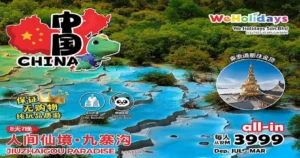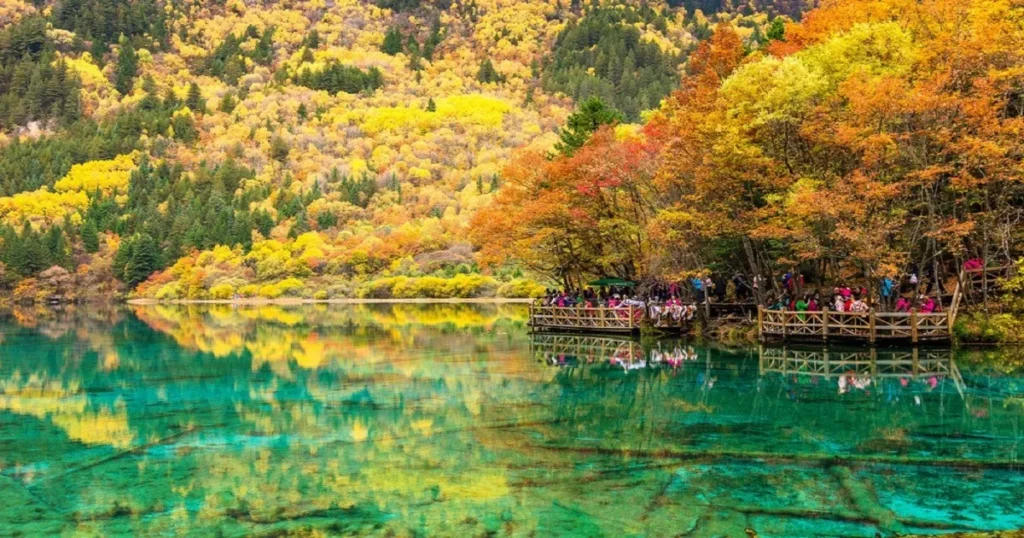Table of Contents
Why Jiuzhaigou Valley Should Top Your Travel Bucket List
- “Ever dreamed of walking through a real-life fairy tale? Jiuzhaigou Valley is where Mother Nature shows off her best work!”
- “Jiuzhaigou Valley, a UNESCO World Heritage Site in Sichuan, China, is a kaleidoscope of turquoise lakes, cascading waterfalls, and forests that look like they’ve been dipped in autumn gold”
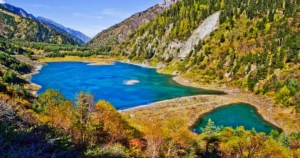
Aerial view of Jiuzhaigou Valley’s vibrant lakes and forests
Picture this: You’re strolling through a landscape so unreal that you’ll start side-eyeing your phone camera, wondering if someone secretly installed a “fantasy world” filter. Welcome to Jiuzhaigou Valley—China’s answer to Pandora (yes, the Avatar one, minus the blue people). This UNESCO World Heritage Site isn’t just a national park; it’s Mother Nature’s ultimate flex.
Let’s cut to the chase. Why should you care? Jiuzhaigou Valley is the only place on Earth where lakes glow like TikTok neon lights, waterfalls roar louder than your ex’s breakup speech, and forests explode into colors that make autumn in New England look basic. Don’t believe me? Ask @TravelTom, who posted: “I thought my Iceland photos were fire… until Jiuzhaigou humbled me.”
Here’s Why Your Bucket List Needs This Fairyland
1. It’s Like Walking Into a Bob Ross Painting (But Better)
Imagine 720 square kilometers of pure magic. Jiuzhaigou Valley packs over 100 turquoise lakes, 12 waterfall systems, and Tibetan villages where locals greet you with yak butter tea (trust me, it’s an experience). The star of the show? Five Flower Lake—a liquid rainbow where water shifts from mint green to deep sapphire depending on the light. Pro tip: Visit at noon when sunlight hits the minerals in the water, turning it into a disco ball for mermaids.
2. You’ll Feel Like Indiana Jones… But With Better Wi-Fi
Adventure junkies, rejoice! Hike the Zharu Valley Trail for jaw-dropping views of snow-capped peaks and valleys so quiet you’ll hear your own heartbeat. Or channel your inner daredevil at Nuorilang Waterfall, a 270-meter-wide curtain of water that’s basically Niagara Falls’ cooler Asian cousin. Pro tip: Wear waterproof everything. You will get misted on, but hey—free skin care!
3. It’s Instagram Gold (No Filter Needed)
Let’s be real: we all travel for the ’Gram. At Jiuzhaigou Valley, every corner is a photo op. Snap a mirror selfie at Mirror Lake (so still, it’ll make you question reality) or strike a pose under the golden leaves of Pearl Shoal in autumn. Even your “blooper reel” shots here will go viral.
4. You Can Escape Crowds Like a Ninja
“But isn’t China crowded?” Sure, but here’s the hack: Visit in April- May (spring blooms) or late September- October (autumn fireworks) for thinner crowds and cheaper hotels. Avoid the Chinese National Holiday (Oct 1-7) unless you enjoy human traffic jams.
5. It’s Cheaper Than Therapy
Stressed? Jiuzhaigou Valley is nature’s Xanax. Breathe in pine-scented air, soak in mineral-rich hot springs, or meditate by Long Lake—the highest and deepest lake here, framed by mountains that look photoshopped. As traveler @ZenJess puts it: “I came for the views, stayed for the soul reset.”
But Wait—There’s a Catch!
Jiuzhaigou Valley isn’t technically a secret anymore. After reopening post-earthquake in 2017, it’s stricter about conservation (daily visitor caps, mandatory eco-friendly buses). Translation: Book tickets early, pack reusable water bottles, and leave no trace—except footprints and maybe a tear of joy.
Bottom Line: If your bucket list has the Grand Canyon, the Swiss Alps, or Banff… Jiuzhaigou Valley deserves the top spot. It’s cheaper, wilder, and 1000% more surreal. As one viral tweet says: “Jiuzhaigou didn’t just meet my expectations—it yeeted them into the stratosphere.”
Ready to Level Up Your Travel Game?
Hit that “Book Now” button before prices spike for autumn (trust me, you want those fiery foliage pics). Your future self—and Instagram followers—will thank you.
Must-See Spots That’ll Make Your Jaw Drop
Let’s get real—Jiuzhaigou Valley isn’t just a pretty postcard. It’s a full-blown, IMAX-in-4D, “OMG-my-eyes-are-not-ready” spectacle. Think of this section as your cheat sheet to the most mind-blowing spots where you’ll drop your selfie stick (and maybe your dignity) from pure awe.
Five Flower Lake – The Liquid Rainbow That Defies Physics
If Mother Nature had a TikTok account, Five Flower Lake would be her viral hit. This lake isn’t just blue or green—it’s every color. Thanks to ancient mineral deposits and sunlight sorcery, the water shifts from neon turquoise to deep violet, depending on the angle. Pro tip: Stand on the wooden boardwalk at noon when the sun hits the lake—it literally GLOWS like a highlighter pen.
Real Talk: Travel blogger @WanderLena admitted: “I took 237 photos here and still couldn’t capture its magic. My camera had an existential crisis.”
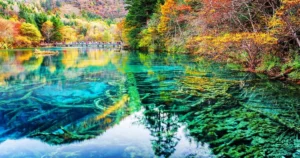
Nuorilang Waterfall – Where Niagara Meets Kung Fu Panda
This 270-meter-wide beast isn’t a waterfall—it’s a natural car wash for your soul. The roar is so loud you’ll feel it in your bones (perfect for drowning out your friend’s karaoke-level singing). Visit in winter, and it transforms into a frozen masterpiece straight out of Frozen 3: Elsa Visits China.
Pro Survival Hack: Wear waterproof gear unless you want to rock the “drowned rat” look for the rest of the day.
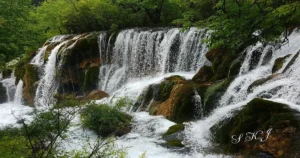
Mirror Lake – The Selfie Spot That Lies Better Than Your Ex
True to its name, Mirror Lake is so still that you’ll swear it’s a Photoshop job. On windless mornings, the water perfectly reflects the surrounding mountains, doubling the scenery (and your Instagram likes). Pro tip: Go at sunrise when the mist rises—it’s like stepping into a Bob Ross painting, complete with “happy little trees.”
Local Secret: Skip the midday crowds. Even the fish here nap after 10 AM.
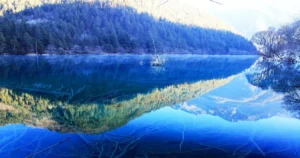
Pearl Shoal – The Waterfall StairMaster
Imagine a giant spilled a truckload of diamonds down a mountainside. That’s Pearl Shoal, a cascading series of tiny waterfalls that glitter like, well, pearls. Walk the boardwalk alongside the rushing water and feel the spray on your face—it’s like a free spa day, minus the awkward small talk.
Fun Fact: This is where the 1986 Journey to the West TV series filmed the “Heavenly Water Curtain” scene. Cue the Monkey King vibes!
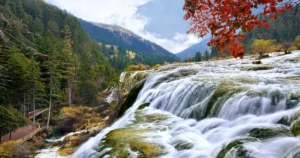
Long Lake – The “Wait, Is That Real?” Moment
Long Lake is the highest and deepest lake in Jiuzhaigou Valley, surrounded by jagged peaks that look like they were carved by a giant with anger issues. The water is so clear that you can see ancient tree trunks chilling at the bottom like underwater ghosts. Visit in October when the mountains wear autumn’s red-and-gold coat—your jaw will hit the ground.
Visitor Quote: “I thought my eyes were broken. No place should be allowed to be this pretty.” – @MikeTheHiker
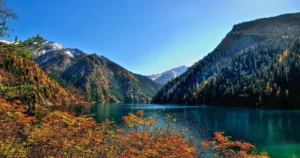
Zharu Valley Trail – For People Who Hate Crowds (And Love Goats)
Want to escape the tourist herds? Hike the Zharu Valley Trail, a hidden gem where you’ll find wild orchids, grazing yaks, and Tibetan prayer flags fluttering in the wind. The trail ends at a sacred mountain worshipped by locals—bring a snack, sit on a rock, and let the silence blow your city-stressed mind.
Local Tip: Buy a handmade prayer flag from a Tibetan vendor. It’s like leaving an “I was here” note for the universe.
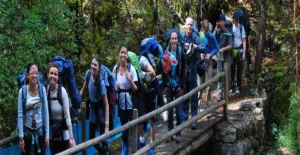
Why Bother?
Because Jiuzhaigou Valley isn’t just a checklist item—it’s a full-body experience. You’ll come home with photos that make your friends accuse you of using filters, stories that sound like exaggerations (but aren’t), and a newfound obsession with turquoise water.
One Last Warning: After visiting, all other nature spots will feel like watching a movie on a flip phone. You’ve been warned.
When to Visit? Pro Tips for Timing
Let’s settle this once and for all: Timing your trip to Jiuzhaigou Valley is like choosing the right filter for your Instagram story—get it wrong, and you’ll miss the magic. But don’t worry, I’ve got the inside scoop (plus a few failsafe hacks) to turn your visit into a “why-is-this-place-so-perfect?!” masterpiece.
Autumn (Sept–Oct): Nature’s Fireworks Show
Why Go: Imagine if Crayola exploded over Jiuzhaigou Valley—that’s autumn here. Forests blaze with red, gold, and orange leaves, lakes mirror the kaleidoscope above, and the air smells like crisp apples and adventure. This is the peak “I need to post this ASAP” season.
Real Talk: Travel vlogger @GoProGuru called it: “Autumn here is what happens when Mother Nature gets a promotion.”
But Beware:
- Crowds swarm like seagulls on fries during Chinese National Week (Oct 1–7). Avoid these dates unless you enjoy elbow-to-elbow selfies.
- Hotels cost 2x more. Book at least 3 months early or embrace hostel life (yaks not included).
Pro Tip: Visit in mid-September for autumn colors and thinner crowds. You’re welcome.
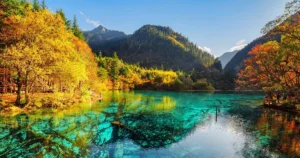
Winter (Nov–Mar): Frozen Fairyland on a Budget
Why Go: Swap crowds for crystalline silence. Waterfalls freeze into icy sculptures, lakes wear glass-like ice sheets, and snow blankets everything like powdered sugar. It’s Frozen meets Game of Thrones—minus the dragons (unless you count the souvenir shops).
Budget Hack: Winter = 50% off hotels and zero queues. Flights? Also cheaper than a Starbucks addiction.
But Beware:
- Temps drop to -10°C (14°F). Pack thermals, or you’ll turn into a human popsicle.
- Some trails close due to ice. Check the park’s website before you go.
Pro Tip: Rent microspikes for your shoes. Walking on icy paths without them is like doing the Macarena on a buttered floor.
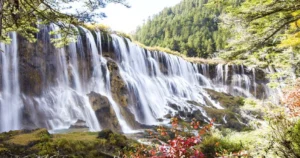
Spring (Apr–June): Flowers, Fewer Tourists, and Zero Regrets
Why Go: Spring in Jiuzhaigou Valley is like that underrated BTS song—everyone’s sleeping on it, but it SLAPS. Rhododendrons bloom in pink bursts, waterfalls rage with melted snow, and temperatures hover around 15°C (59°F)—aka hoodie weather perfection.
Hidden Gem: Local Tibetan festivals kick off in May. Think horse races, bonfires, and yak butter tea chugging contests (yes, really).
But Beware:
- Rain showers pop up like unskippable YouTube ads. Pack a raincoat and a sense of humor.
Pro Tip: Visit in late April for blooming flowers and dry trails.
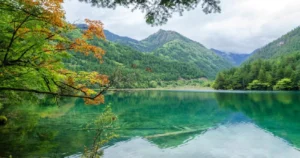
Summer (July–Aug): Green, Gorgeous, and… Packed
Why Go: Summer turns Jiuzhaigou Valley into a lush emerald paradise. Waterfalls are at their thunderous best, and the cool mountain air (avg.. 20°C/68°F) is a sweet escape from China’s city saunas.
But Beware:
- July and August = school holidays. Crowds rival a Taylor Swift concert.
- Afternoon thunderstorms roll in faster than your ex’s new relationship.
Pro Tip: Arrive at the park gates by 7 AM. You’ll beat the crowds and snag photos without 50 strangers photobombing.
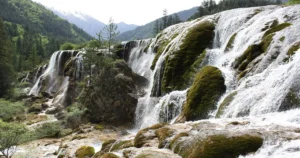
The Ultimate Cheat Code
Best Overall Month: October (after National Week). You’ll get autumn’s colors, thinner crowds, and weather that’s Goldilocks-approved—not too hot, not too cold.
Worst Month: July. Rain + crowds = “why did I leave my couch?” regret.
One Last Thing: The Secret Hour
No matter when you visit, sunrise is Jiuzhaigou Valley’s VIP hour. At 6:30 AM, you’ll have Mirror Lake’s reflections all to yourself, with mist dancing over the water and the smug satisfaction of beating the tour buses. Bring coffee. Thank me later.
Why This Matters:
Jiuzhaigou Valley’s beauty changes faster than TikTok trends. Pick the right season, and you’ll see nature at its most extra. Pick wrong? Well, at least you’ll have a funny story about that time it rained inside your shoes.
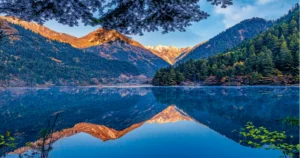
Survival Guide for First-Timers
Let’s be honest: Jiuzhaigou Valley isn’t Disneyland. There are no churro stands every 50 meters, and Mickey Mouse won’t save you if you wear flip-flops to hike. But fear not! With these pro tips, you’ll survive (and thrive) in China’s most jaw-dropping national park—without looking like a clueless tourist.
Altitude Adjustment 101: Don’t Let the Mountain Win
Jiuzhaigou Valley sits at 2,000–4,700 meters (6,500–15,400 ft). Translation: Your lungs might stage a rebellion.
Do This:
- Hydrate like it’s your job: The air here is drier than your ex’s texts. Drink 3L of water daily.
- Slow your roll: Walk like you’re strolling through a museum, not sprinting to a Black Friday sale.
- Snack on chocolate or glucose tablets: This keeps energy up and altitude headaches at bay.
Real Talk: “I thought I was fit… then Jiuzhaigou laughed at my gym selfies.” – @HikingHannah
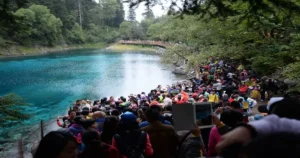
What to Pack (Besides Your Sense of Adventure)
Forget the “just wing it” mentality. Jiuzhaigou Valley demands strategy.
Non-Negotiables:
- Sturdy shoes: Trails are slicker than a politician’s promise. Sneakers = death wish.
- Layers, layers, layers: Mornings are chilly, afternoons are sunny, and evenings are “Where’s my parka?!”
- Power bank: You’ll drain your phone battery faster than a TikTok livestream.
- Reusable water bottle: Save the planet and avoid paying $5 for bottled water.
Pro Hack: Pack yak meat jerky (sold at park gates). It’s salty, chewy, and weirdly addictive—like nature’s beef jerky.
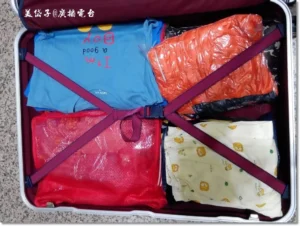
Avoid the “Human Traffic Jam” Nightmare
Jiuzhaigou Valley gets 40,000+ daily visitors in peak season. Here’s how to dodge the crowds:
- Arrive at 7 AM: Beat the tour buses. Early birds get empty trails and misty lake photos.
- Take the left path: Most tours go right. Be a rebel.
- Skip lunch hour: Eat a big breakfast, then explore while others queue for noodles.
Local Secret: The shuttle buses get packed—walk the Rize Valley route instead. It’s quieter and 10x prettier.
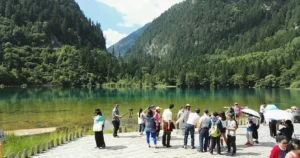
Food & Toilets: The Real Survival Guide
Let’s address the elephant in the room: Yes, you can find edible food and clean toilets here.
Food Tips:
- Eat at park restaurants: Stick to simple dishes like fried rice or noodle soup. Avoid “mystery meat” skewers.
- Pack snacks: Granola bars, nuts, and fruit. Pro tip: Local peaches are juicier than a Netflix drama.
Toilet Intel:
- Bathrooms are scarce after 10 AM. Go when you see one—even if you don’t need to. Trust me.
- Carry toilet paper and hand sanitizer. Some stalls are TP-free zones.
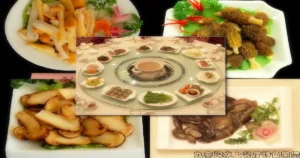
Don’t Be That Tourist: Respect the Rules
Jiuzhaigou Valley is a UNESCO site, not your backyard.
Golden Rules:
- Stay on the boardwalks: Straying kills fragile ecosystems (and earns you angry ranger whistles).
- No drones allowed: Unless you want your $1,500 gadget confiscated by Chinese authorities.
- Don’t litter: Fines start at 500 RMB ($70). Also, karma’s watching.
Pro Move: Join a guided eco-tour. You’ll learn cool facts and avoid becoming a meme on local WeChat groups.
SOS Tips for Disaster Avoidance
When Sh*t Hits the Fan (Literally):
- Altitude sickness? Head to lower elevations and sip Coca-Cola (locals swear it helps).
- Lost? Look for park staff in red jackets—they’re like human Google Maps.
- Rain surprise? Buy a plastic poncho from vendors. It’ll make you look like a walking grocery bag, but hey—dry > stylish.
Bottom Line: Jiuzhaigou Valley rewards the prepared and punishes the clueless. Follow these tips, and you’ll leave with epic memories—not a story about that time you got lost and befriended a yak.
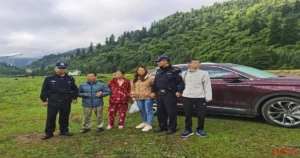
Cultural Gems Beyond the Scenery
Let’s be real—Jiuzhaigou Valley could win a beauty pageant with its eyes closed. But what truly makes it unforgettable? The living, breathing Tibetan culture that’s been thriving here for 1,000+ years. Think of this as your backstage pass to the traditions, flavors, and stories that turn a pretty trip into a “holy-cow-I-actually-learned-something” adventure.
Bonfire Nights: Where Tibetans Party Like It’s 1699
Forget Coachella. The real vibe is at a Tibetan bonfire night in Jiuzhaigou Valley. Locals in vibrant costumes spin, stomp, and sing folk songs that’ll make your Spotify playlist feel basic. Join the Guozhuang Dance (think line dancing, but with more yak bells), or just clap along while sipping chang (fermented barley wine—tastes like kombucha’s wild cousin).
Real Talk: Traveler @NomadNina posted: “I tripped over my own feet trying to dance, but the granny next me just laughed and handed me more wine. 10/10 would embarrass myself again.”
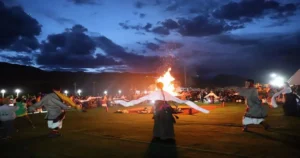
Yak Butter Tea: The Love-It-or-Hate-It Lifeline
Yak butter tea is to Tibetans what espresso is to Italians—a salty, creamy, slightly funky fuel for survival. Made with tea leaves, yak butter, and salt, it’s like drinking a warm hug from a hairy alpine cow. Pro tip: Add sugar if you’re a newbie. Locals will side-eye you, but your taste buds will throw a party.
Where to Try: Pop into a family-run guesthouse in Zharu Village and say “Tashi delek!” (hello). They’ll serve you tea with a side of life stories.
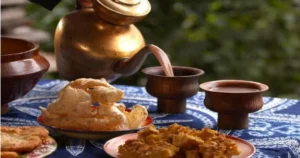
Handicrafts That Put Etsy to Shame
Skip the mass-produced keychains. Jiuzhaigou Valley’s Tibetan artisans create magic you’ll actually want to take home:
- Thangka paintings: Intricate Buddhist scrolls that take months to paint. Perfect for your “meditation corner” (aka that spot where your yoga mat collects dust).
- Silver jewelry: Chunky turquoise rings and earrings that scream, “I’m a globetrotter with great taste.”
- Handwoven bags: Made from yak wool—sturdier than your ex’s excuses.
Bargain Hack: Smile, say “Gong ga” (thank you), and offer 60% of the asking price. Worst case? You get a free Tibetan lesson.
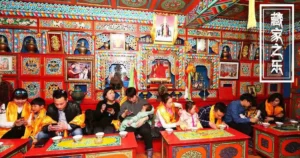
Monasteries & Myths: Where Spirituality Meets Scenery
Hidden in the valleys around Jiuzhaigou are ancient monasteries where red-robed monks chant prayers that echo through the mountains. Visit Zechawa Village’s small temple—spin the prayer wheels for good luck or just sit and let the incense calm your TikTok-addicted brain.
Cool Fact: Locals believe the lakes here are guarded by goddesses. Drop a coin in Long Lake, and legend says you’ll return someday. (Or just lose 1 RMB. Either way, it’s a vibe.)
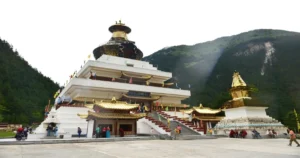
Festivals That Go Harder Than Your New Year’s Resolutions
Time your trip with a Tibetan festival, and Jiuzhaigou Valley turns into a cultural blockbuster:
- Horse Racing Festivals (July): Watch riders gallop bareback like Tibetan cowboys. Spoiler: They make rodeos look basic.
- Losar (Tibetan New Year, Feb/March): Fireworks, feasts, and khapses (fried dough twists) that’ll ruin you for donuts.
Pro Tip: Ask your hotel about local events. Even tiny villages throw impromptu parties with more heart than a Marvel movie.
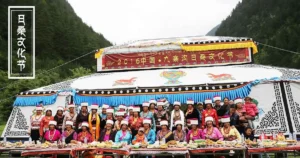
The Language of Kindness: Learn These 3 Tibetan Phrases
Want to make locals light up like the Northern Lights? Master these:
- “Tashi delek” = Hello / Good luck. (Use liberally—it’s like cultural WD-40.)
- “Zo rig” = Beautiful. (Point at scenery, food, or their grandma’s earrings.)
- “Ka-leh-peh” = No problem. (Because yak butter tea spillage happens.)
Why This Matters:
Jiuzhaigou Valley isn’t just a nature show—it’s a living museum of Tibetan heritage. You’ll leave with more than photos; you’ll have stories about the granny who taught you to dance, the monk who laughed at your terrible pronunciation, and the realization that yak butter isn’t just for toast.
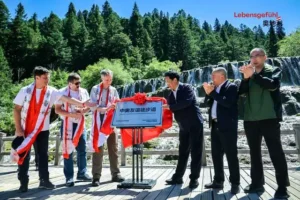
How to Get There Without Losing Your Mind
Let’s cut through the BS: Getting to Jiuzhaigou Valley isn’t as simple as hopping on a subway. But with the right intel, you’ll avoid the “are-we-there-yet?” meltdowns and arrive fresher than a K-pop idol’s skincare routine. Here’s your no-nonsense guide to conquering the journey like a pro.
Option 1: Fly Like a Boss (But Maybe Bring a Neck Pillow)
Route: Fly to Jiuzhai Huanglong Airport (JZH) from Chengdu, Beijing, or Shanghai.
Why It Rocks: 1-hour flight vs. 8-hour bus ride. Need I say more?
But Beware:
- Flights get pricier than a Gucci flip-flop during peak seasons (Sept–Oct). Book at least 2 months early.
- Turbulence is common. Pop a motion sickness pill unless you enjoy feeling like a human washing machine.
Pro Tip: Grab a window seat. The view of the snow-capped Sichuan mountains will make you forget your cramped knees.
Real Talk: “The landing was bumpy, but seeing those turquoise lakes from the air? Worth every white-knuckle second.” – @FearfulFlyer
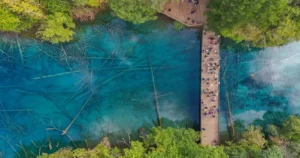
Option 2: Bus Ride – For Masochists and Scenery Addicts
Route: 8–10 hours from Chengdu’s Chadianzi Bus Station to Jiuzhaigou Valley.
Why It (Sorta) Rocks: It’s cheap (¥150–¥200/20–20–28) and stupidly scenic—think emerald valleys, yaks grazing, and rivers that sparkle like Instagram filters.
Survival Kit:
- I use a neck pillow + noise-canceling headphones (snoring neighbors are inevitable).
- Download Netflix shows. The Wi-Fi is as reliable as a politician’s promise.
- Pack snacks. Bus stop bathrooms are… an adventure.
Local Secret: Book the VIP sleeper bus (yes, they exist!). You’ll get a flatbed and blankets. It’s like business class… if business class smelled faintly of instant noodles.
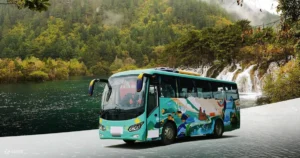
Option 3: Private Car – Flex Your Inner Rockstar
Route: Hire a driver from Chengdu (¥1,500–¥2,000/210–210–280 one-way).
Why It Rocks: Stop wherever you want—photo ops at Minshan Mountains, lunch in a Tibetan village, pee breaks without 20 people watching.
But Beware:
- Mountain roads have more twists than a Taylor Swift breakup song. Motion sickness meds = mandatory.
- Landslides in rainy season (July–Aug). Check weather reports like your life depends on it (because it kinda does).
Pro Tip: Split the cost with 3–4 friends. Cheaper than therapy and way more fun.
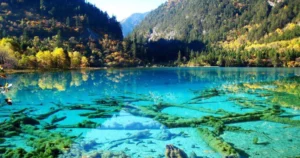
Option 4: The “I’m Too Lazy to Plan” Hack
Book a Tour: Let someone else handle the logistics. Most tours include transport, park tickets, and a guide who’ll say “Jiuzhaigou Valley” 100 times (SEO bonus?).
Why It’s Genius:
- No stress. Just show up and let them herd you around like a happy sheep.
- Guides know secret photo spots and where to find clean toilets (the real MVP).
But beware: Group lunches are… chaotic. Pack hand sanitizer and low expectations.
Arrival Pro Tips (Because the Struggle Isn’t Over)
- Altitude Adjustment: The valley sits at 2,000m+. Hydrate, move slowly, and avoid alcohol your first day—unless you want a hangover + altitude headache combo.
- Park Shuttles: Buy shuttle tickets online. The park is HUGE, and walking the whole thing is a one-way ticket to Blistersville.
- SIM Cards: Buy a China Mobile SIM in Chengdu. Google Maps doesn’t work here, but Baidu Maps will save your bacon.
Why This Matters:
Jiuzhaigou Valley isn’t Disneyland—you can’t just Uber there. But nail the journey, and you’ll earn bragging rights plus a story about that time you survived a bus ride with a chicken (true story, ask the locals).
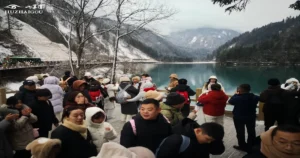
Ready to Book? Here’s Your Game Plan
So you’re ready to trade your couch potato status for a “Jiuzhaigou Valley conqueror” badge? Awesome. But before you hit “book,” let’s avoid rookie mistakes that could turn your dream trip into a “why-didn’t-I-read-this-first?!” meme. Here’s your foolproof playbook.
Step 1: Time It Like a Pro (Or Pay the Price)
Jiuzhaigou Valley’s beauty has an expiration date—yours.
- Book Flights/Hotels 3–4 Months Early for autumn (Sept–Oct) or spring (Apr–May). Wait, and prices skyrocket faster than a SpaceX launch.
- Cheat Code: Use Skyscanner’s “Whole Month” view to snag the cheapest dates. Pro tip: Mid-week flights are 20% cheaper than weekends.
Real Talk: “I booked my October trip in June and saved $300. Suck it, procrastination!” – @BudgetTravelGary
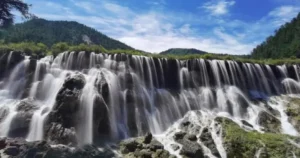
Step 2: Pick Your Basecamp (No Tents Required)
Jiuzhaigou Valley has two main zones:
- Goukou (Valley Entrance): Hotels here are walkable to the park. Think Holiday Inn vibes with noodle shops next door. Perfect for early birds.
- Zharu Village: Tibetan guesthouses with yak butter tea on tap. Quirky, cheap, and so Instagrammable.
Pro Tip: Avoid hotels labeled “scenic view.” You’re here to see the actual park, not a postcard through your window.
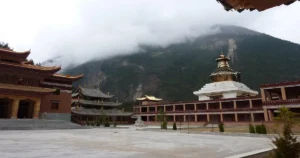
Step 3: Tickets & Tours – Skip the Line, Keep Your Sanity
Jiuzhaigou Valley limits daily visitors. Don’t be the guy crying at the gate.
- Buy Park Tickets Online via CTrip or WeChat. They sell out faster than Taylor Swift concert tickets.
- Shuttle Pass = Non-Negotiable: The park is 720 km². Walking it all is like marathon training in hiking boots.
Budget Hack: Book a 2-day pass (¥280/$40). One day is not enough—you’ll miss 50% of the magic.
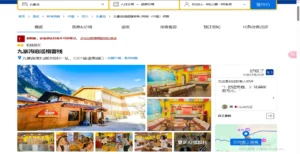
Step 4: Transport Hacks – Ditch the Chaos
From Airport to Park:
- Shuttle Bus: ¥45 ($6), 1.5 hours. Boring but reliable.
- Private Taxi: ¥200 ($28). Splurge if you’re jet-lagged and cranky.
Pro Tip: Download DiDi (China’s Uber) before arrival. Cash won’t save you when you’re stranded at 10 PM.
Step 5: Pack Like a Wizard (Not a Noob)
Essentials You’ll Regret Forgetting:
- Power Adapter: China uses Type A/C plugs. No juice = no photos = sad you.
- VPN: Google, Instagram, and WhatsApp are blocked. ExpressVPN is your digital lifeline.
- Comfy Shoes: Trails here punish flip-flops like your mom punishes swearing.
Step 6: Avoid These Booking Blunders
- Mistake 1: Booking flights that land after 3 PM. The last shuttle to the park leaves at 5 PM.
- Mistake 2: Assuming credit cards work everywhere. Load up on cash (¥2,000+).
- Mistake 3: Forgetting travel insurance. Altitude sickness happens, and hospitals here don’t take Visa.
The “I’m Too Lazy” Button
If planning feels like homework, book a Klook tour. They handle tickets, transport, and guides. You just show up and look pretty.
Bottom Line: Jiuzhaigou Valley isn’t a “maybe next year” kind of place. Climate change is real, crowds are growing, and those turquoise lakes won’t stay pristine forever. So, quit scrolling cat videos and start clicking “confirm.”
CTA: Hit that “Book Now” button faster than you’d swipe right on Ryan Reynolds’ profile. Your future self (and FOMO) will thank you.
Final Word: Why You’ll Regret Waiting
Let’s get brutally honest: Jiuzhaigou Valley isn’t getting any younger, and neither are you. Every year, 5 million people slap this place onto their bucket lists—but only 10% actually go. Don’t be the person who spends retirement yelling, “I should’ve gone when the lakes were still turquoise!” Here’s why hitting “book now” beats “maybe next year” every damn time.
Reason 1: The Clock Is Ticking (Literally)
Jiuzhaigou Valley’s beauty is fragile AF. After the 2017 earthquake, some lakes dried up temporarily, and conservation rules got stricter than a TikTok mom’s screen-time limits. Daily visitor caps? Check. Mandatory eco-buses? Check. Rumor has it that they might raise ticket prices by 30% in 2025 to fund preservation. Translation: Go now, or pay later—in cash and FOMO tears.
Real Talk: “I almost skipped it in 2018. Went in 2023 and saw algae starting to bloom in one lake. Don’t wait.” – @EcoWarriorEva
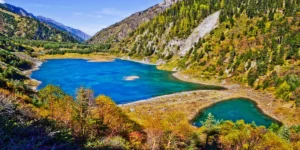
Reason 2: Crowds Are Coming for Your Zen Moment
In 2023, Jiuzhaigou Valley welcomed 7.2 million tourists. By 2030? Experts predict 12 million. Imagine trying to snap that perfect Mirror Lake selfie with 50 influencers photobombing in Lululemon leggings. Right now, you can still find quiet trails at sunrise. Soon? It’ll be Times Square with waterfalls.
Pro Tip: Visit before 2025. UNESCO’s “Sustainable Tourism” plan could mean stricter limits—or lottery systems to enter.
Reason 3: Your Phone Can’t Capture the Magic Forever
Sure, your iPhone 15 Pro Max can shoot 4K video. But no filter replicates the way Jiuzhaigou Valley’s autumn leaves crunch under your boots, the mist from Nuorilang Waterfall prickling your skin, or the smell of pine mixed with yak butter tea. These memories aren’t just for your camera roll—they’re for your soul.
Real Talk: “Photos don’t do it justice. You have to feel the altitude steal your breath and hear the waterfalls roar. It’s… humanizing.” – @SoulSearcherSam
Reason 4: The World is Changing. Fast.
Climate change isn’t just melting glaciers—it’s messing with Jiuzhaigou Valley’s delicate ecosystem. Warmer temps mean unpredictable weather, algae growth in lakes, and shorter autumn color seasons. Locals say winters aren’t as icy as they were 10 years ago. Translation: That frozen waterfall selfie? It might be watercolor in a decade.
Reason 5: You’re Not Getting Any Younger
Let’s talk about the elephant in the room: You might not be able to hike 15km at 2,000m altitude forever. Those knees won’t stay TikTok-dance-ready, and altitude headaches hit harder after 40. Adventure now before your idea of “thrill-seeking” becomes choosing spicy vs. mild at Panda Express.
Pro Tip: If you’re over 50, book a private guide. They’ll pace you, carry your water, and laugh with you (not at you) when you need 5 rest stops.
The Ultimate Fear Factor
Ask anyone who’s been to Jiuzhaigou Valley what they regret most. Spoiler: It’s not going sooner. It’s the kind of place that haunts your Instagram feed once you’re back home, whispering, “Why did you leave?”
Final CTA:
Stop scrolling. Stop “researching.” Stop telling yourself you’ll go “when things calm down.” Jiuzhaigou Valley isn’t a destination—it’s a wake-up call. Book your trip today, or spend forever wondering what that liquid rainbow looked like in real life.
